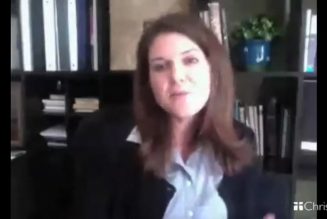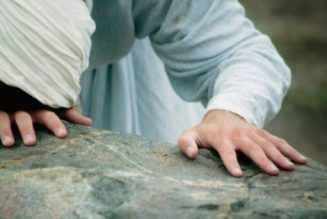
Luke describes the arrival of Jesus in Jerusalem at the beginning of that last week of his earthly life:
As he was drawing near, at the descent of the Mount of Olives, the whole multitude of the disciples began to rejoice and praise God with a loud voice for all the mighty works that they had seen, saying, “Blessed is the King who comes in the name of the Lord! Peace in heaven and glory in the highest! (Luke 19:37, 38)
Palm Sunday: Today and To Come
There is no doubt what was in the disciples’ minds. This was the fulfillment of Zechariah’s prophecy given centuries earlier:
Rejoice greatly, O daughter of Zion! Shout aloud, O daughter of Jerusalem! Lo, your king comes to you; triumphant and victorious is he, humble and riding on an ass, on a colt, the foal of an ass. I will cut off the chariot from Ephraim and the war horse from Jerusalem, and the battle bow shall be cut off, and he shall command peace to the nations; his dominion shall be from sea to sea, and from the River to the ends of the earth. (Zechariah 9:9, 10)
The long-awaited Messiah had come, the king of Israel, and not just of Israel but of all the earth. Jerusalem would be his capital city. From here he would rule the world in peace and righteousness. What a day this was! How their hearts must have pounded in their chests! And must not their hands have been sweaty like warriors in readiness just before the bugle sounds the battle! How would he do it? Would he whip up the enthusiastic crowds and storm the Roman praetorium—a people’s revolution? Or would he call down fire from heaven to consume the enemies of God? Would any of his followers be lost in the struggle? The tension of the moment must have been tremendous!
The Pharisees had a double reason for wanting this kind of welcome silenced. On the one hand, this Jesus was a threat to their authority, and they envied his popularity (Mark 15:10). On the other hand, they feared a Roman backlash to all this seditious talk of another king (John 11:48). Therefore they say to Jesus, “‘Teacher, rebuke your disciples.’ But he answered, ‘I tell you, if these were silent, the very stones would cry out!”‘ (Luke 19:39, 40). No, he will not rebuke them for this. Not now. The hour has come. The authority of the Pharisees is done for. If the Romans come, they come. He will not silence the truth any longer. To be sure the disciples’ understanding of Jesus’ kingship at this point is flawed. But hastening events will correct that soon enough. In essence they are correct. Jesus is the king of Israel, and the kingdom he is inaugurating will bring peace to all the nations and spread from sea to sea. The book of Revelation pictures the final fulfillment of Palm Sunday in the age to come like this:
I looked and behold, a great multitude which no man could number, from every nation, from all tribes and peoples and tongues, standing before the throne and before the Lamb, clothed in white robes, with palm branches in their hands, and crying out with a loud voice, “Salvation belongs to our God who sits upon the throne, and to the Lamb!” (Revelation 7:9, 10)
The entry into Jerusalem with waving palms (John 12:13) was a short-lived preview of the eternal Palm Sunday to come. It needed to be said. If the disciples hadn’t said it, the rocks would have.
I like to think of all our worship in this age as rehearsal for the age to come. One day we, who by God’s grace have been faithful to the Lord, are going to stand with innumerable millions of believers from Bangladesh, Poland, Egypt, Australia, Iceland, Cameroon, Ecuador, Burma, Borneo, Japan, and thousands of tribes and peoples and languages purified by Christ, with palms of praise in our hand. And when we raise them in salute to Christ, he will see an almost endless field of green, shimmering with life and pulsating with praise. And then like the sound of a thousand Russian choruses, we will sing our song of salvation, while the mighty Christ, with heartfelt love, looks out over those whom he bought with his own blood.
Had Jesus taken his throne on that first day of palms, none of us would ever be robed in white or waving palms of praise in the age to come. There had to be the cross, and that is what the disciples had not yet understood. Back in Luke 9, as Jesus prepared to set out for Jerusalem from Galilee, he tried to explain this to his disciples. In verse 22 he said, “The Son of Man must suffer many things, and be rejected by the elders and chief priests and scribes, and be killed, and on the third day be raised.” And in verse 44 he told them, “Let these words sink into your ears; for the Son of Man is to be delivered into the hands of men.” But verse 45 tells us, “They did not understand this saying, and it was concealed from them that they should not perceive it; and they were afraid to ask him about this saying.” Therefore, their understanding of Jesus’ last journey to Jerusalem was flawed. They saw him as a king moving in to take control. And he was. But they could not grasp that the victory Jesus would win in Jerusalem over sin and Satan and death and all the enemies of righteousness and joy—that this victory would be won through his own horrible suffering and death; and that the kingdom which they thought would be established immediately (Luke 19:11) would, in fact, be thousands of years in coming. And their misunderstanding of Jesus’ journey to Jerusalem results in a misunderstanding of the meaning of discipleship. This is why this is important for us to see, lest we make the same mistake.
Palm Sunday Marked Jesus’ Resolution to Die
In Luke 9:51-56 we learn how not to understand Palm Sunday. Let’s look at it together. “When the days drew near for him to be received up, he set his face to go to Jerusalem.” To set his face towards Jerusalem meant something very different for Jesus than it did for the disciples. You can see the visions of greatness that danced in their heads in verse 46: “An argument arose among them as to which of them was the greatest.” Jerusalem and glory were just around the corner. O what it would mean when Jesus took the throne! But Jesus had another vision in his head. One wonders how he carried it all alone and so long. Here’s what Jerusalem meant for Jesus: “I must go on my way today and tomorrow and the day following; for it cannot be that a prophet should perish away from Jerusalem”(Luke 13:33). Jerusalem meant one thing for Jesus: certain death. Nor was he under any illusions of a quick and heroic death. He predicted in Luke 18:31f., “Behold, we are going up to Jerusalem, and everything that is written of the Son of man by the prophets will be accomplished. For he will be delivered to the Gentiles, and will be mocked and shamefully treated and spit upon; they will scourge him and kill him.” When Jesus set his face to go to Jerusalem, he set his face to die.
Remember, when you think of Jesus’ resolution to die, that he had a nature like ours. He shrunk back from pain like we do. He would have enjoyed marriage and children and grandchildren and a long life and esteem in the community. He had a mother and brothers and sisters. He had special places in the mountains. To turn his back on all this and set his face towards vicious whipping and beating and spitting and mocking and crucifixion was not easy. It was hard. O how we need to use our imagination to put ourselves back into his place and feel what he felt. I don’t know of any other way for us to begin to know how much he loved us. “Greater love has no man than this, that a man lay down his life for his friends” (John 15:13).
If we were to look at Jesus’ death merely as a result of a betrayer’s deceit and the Sanhedrin’s envy and Pilate’s spinelessness and the soldiers’ nails and spear, it might seem very involuntary. And the benefit of salvation that comes to us who believe from this death might be viewed as God’s way of making a virtue out of a necessity. But once you read Luke 9:51 all such thoughts vanish. Jesus was not accidentally entangled in a web of injustice. The saving benefits of his death for sinners were not an afterthought. God planned it all out of infinite love to sinners like us and appointed a time. Jesus, who was the very embodiment of his Father’s love for sinners, saw that the time had come and set his face to fulfill his mission: to die in Jerusalem for our sake. “No one takes my life from me (he said), but I lay it down of my own accord” (John 10:18).
Jesus’ Journey Is Our Journey
So Jesus sets out for Jerusalem, and it says in the text that “he sent messengers ahead of him, who went and entered a village of the Samaritans to make ready for him; but the people would not receive him because his face was set toward Jerusalem.” It doesn’t really matter whether this rejection is just because Jesus and his companions are Jews and Samaritans hate Jews, or whether the rejection is a more personal rejection of Jesus as the Messiah on his way to reign in Jerusalem. What matters for the story is simply that Jesus is already being rejected, and then the focus shifts to the disciples’ response, specifically the response of James and John.
James and John ask Jesus, “Lord, do you want us to bid fire to come down from heaven and consume them?” (verse 54). Jesus had already named these brothers “sons of thunder” (Mark 3:17). Here we get a glimpse of why. I take this passage very personally because my father named me after one of these sons of thunder. And I think I probably would have said what John did here: “Jesus, we are on the way to victory. Nothing can stop us now. Let the fire fall! Let the judgment begin! O, how Jerusalem will tremble when they see us coming!” Jesus turns, the text says, and rebuked them (verse 55). And they simply went to another town.
Now what does this mean? It means, first of all, that a mistaken view of Jesus’ journey to Jerusalem can lead to a mistaken view of discipleship. If Jesus had come to execute judgment and take up an earthly rule, then it would make sense for the sons of thunder to begin the judgment when the final siege of the Holy City starts. But if Jesus had come not to judge but to save, then a radically different form of discipleship is in order. Here is a question put to every believer by this text: does discipleship mean deploying God’s missiles against the enemy in righteous indignation? Or does discipleship mean following him on the Calvary road which leads to suffering and death? The answer of the whole New Testament is this: the surprise about Jesus the Messiah is that he came to live a life of sacrificial, dying service before he comes a second time to reign in glory. And the surprise about discipleship is that it demands a life of sacrificial, dying service before we can reign with Christ in glory.
What James and John had to learn—what we all must learn—is that Jesus’ journey to Jerusalem is our journey, and if he set his face to go there and die, we must set our face to die with him. One might be tempted to reason in just the opposite way: that since Jesus suffered so much and died in our place, therefore, we are free to go straight to the head of the class, as it were, and skip all the exams. He suffered so we could have comfort. He died so we could live. He bore abuse so we could be esteemed. He gave up the treasures of heaven so we could lay up treasures on earth. He brought the kingdom and paid for our entrance and now we live in it with all its earthly privileges. But all this is not biblical reasoning. It goes against the plain teaching in this very context. Luke 9:23, 24 reads: “If any man would come after me, let him deny himself and take up his cross daily and follow me. For whoever would save his life will lose it; and whoever loses his life for my sake, he will save it.” When Jesus set his face to walk the Calvary road, he was not merely taking our place; he was setting our pattern. He is substitute and pacesetter. If we seek to secure our life through returning evil for evil or surrounding ourselves with luxury in the face of human need, we will lose our life. We can save our life only if we follow Christ on the Calvary road. Jesus died to save us from the power and punishment of sin, not from the suffering and sacrifices of simplicity for love’s sake.
Notice verses 57 and 58 (this is Jesus’ way of correcting James’ and John’s misconception about the glories of discipleship): “As they were going along the road, a man said to him, ‘I will follow you wherever you go.’ And Jesus said to him, ‘Foxes have holes, and the birds of the air have nests; but the Son of Man has nowhere to lay his head.”‘ Why does Jesus tell a would-be disciple that he has no place to lay his head? The answer is simple enough for a child to see: because he expects disciples to be like him, and he wants them to know it is costly; the Calvary road is not the road of material prosperity. Now that doesn’t mean disciples have to sleep standing up, but it does have something to say about how many places you’ve invested in to lay your head; and how much comfort and luxury you seek to surround yourself with.
Brothers and sisters, with 16,000 hidden people groups still waiting to hear the gospel, and millions of children starving through no fault of their own, and many people in our own country hard-put because of joblessness and emptiness, it is unconscionable that disciples of Jesus Christ can go right on pursuing the American dream. What excites me is an alternative dream—a dream of breaking loose from the shackles of this self-serving, consumer culture in which we live—a dream of doing something radical. Something radically loving with your house, something radically loving with your portfolio and your income, something radically loving with your free evenings, something radically loving with your job. Some of you are discovering such wonderful freedom from the love of things. And hand in hand with that comes an amazing freedom from vengeance. The more secure you are in God rather than things, the less inclined you are to return evil for evil and the more open you are to nitty-gritty involvement with those who are least lovely and most needy. The more this happens, the more striking and fruitful will be the witness of the church to Jesus.
If Christ set his face to go to Jerusalem, we ought to help one another week after week to set our faces like flint against the allurements of riches and retaliation and follow the King of kings on the Calvary road.
© Desiring God [Editor’s Note: Taken from a sermon preached by John Piper at Bethlehem Baptist Church entitled “He Set His Face to Go to Jerusalem.” The full text of this sermon may be found here.]
Permissions: You are permitted and encouraged to reproduce and distribute this material in any format provided that you do not alter the wording in any way and do not charge a fee beyond the cost of reproduction. For web posting, a link to this document on our website is preferred. Any exceptions to the above must be approved by Desiring God.
Please include the following statement on any distributed copy: By John Piper. © Desiring God. Website: desiringgod.org
Photo Credit: Thinkstock










